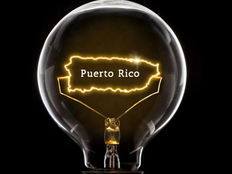
Puerto Rico Governor Ricardo Rossello recently proposed that the Puerto Rico Energy Commission become a subordinate part of the overarching Public Service Commission.
The move could harm the commission’s current role of being an independent energy expert overseeing Puerto Rico’s electric power services, according to bond insurers Assured Guaranty and National Public Financial Guarantee.
Be sure to read our previous article on what Puerto Rico’s bankruptcy means to muni investors.
What Lead to PREPA’s Demise?
The Puerto Rico Electric Power Authority was an unregulated monopoly for over 70 years, which set the stage for broad mismanagement and corruption. These dynamics led to significant debt and an aging infrastructure. In 2014, the government created a commission with political independence and scientific expertise to address these issues, which became known as the Puerto Rico Energy Commission, or PREC.
The PREC’s mission was to achieve a “reliable, efficient and transparent electric system, which provides power services at reasonable prices.” As a politically independent organization composed of professionals, the goal was to eliminate corruption by keeping politicians out of the inner workings of the power grid and to ultimately rescue the failing power authorities across Puerto Rico from bankruptcy or outright failure.
Unfortunately, the timing of the PREC’s creation was a little late given the scope of the issues. PREPA had deferred upgrades to its dated infrastructure while tough union agreements created inefficiencies in the labor force. It also failed to prepare for natural disasters in a region that’s prone to them, while minimum standards for wind resistance for concrete poles supporting power lines were ignored by the telecommunication companies that shared its infrastructure.
After nearly three years of restructuring talks and the unraveling of two separate deals, PREPA filed for bankruptcy in mid-2017 with $8.2 billion in debt, including approximately $4.9 billion backed by bond insurers. The 2016 Puerto Rico rescue law, known as PROMESA, provided the organization with the tools needed to ensure its uninterrupted operation until a restructuring was agreed upon.
What is PREPA’s Current Situation?
Puerto Rico governor Ricardo Rossello announced plans to privatize PREPA, which could force bondholders to fight for creditor rights in court. The move isn’t likely to be positive for bondholders, given the high level of investment that’s needed to bring the infrastructure back up to speed. Bondholders and insurance companies continue to argue that their debts should be settled with either cash or assets – but it’s quickly becoming a difficult argument.
The crux of the problem is that one million Puerto Rican residents remain without power, which creates a difficult bargaining position for these creditors. Policymakers deciding between the humanitarian needs of these residents and the rights of bondholders are facing increasing pressure to resolve the crisis and reduce debts, while aggressive bondholders risk looking like profiteers looking to make a quick buck on distressed bonds.
Discover bonds offering attractive yields using our tool here.
Be sure to check out this article to remain aware of the due diligence process for evaluating municipal bonds.
What is the Governor Proposing?
Rossello would like to see the Puerto Rico Energy Commission become subordinate to an overarching Public Service Commission. Without PREC’s political independence, PREPA would lose its independent professional regulatory oversight, which has been essential to the commonwealth’s economic revitalization and access to the capital markets as it recovers, according to bond insurers hoping to block the move.
Earlier this year, the Oversight Board’s General Counsel, Jaime El Koury, sent a letter to the Energy Commission’s Interim President saying that PROMESA makes it clear that many of the Oversight Board’s powers are substantive and that PROMESA, as federal law, preempts conflicting commonwealth law.
The Bottom Line
It is likely in bondholders’ best interest that the current structure of the Puerto Rico Energy Commission be retained, as it provides some form of regulatory pressure and barrier to corruption. The commission is run by an experienced team that can likely help improve PREPA’s current situation and set the right walls and risk processes to prevent the kind of mismanagement that got PREPA into trouble in the first place.
Check out the different ways to invest in muni bonds to stay up to date with current investment strategies.






